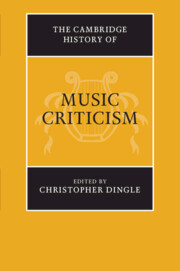Book contents
- The Cambridge History of Music Criticism
- The Cambridge History of Music
- The Cambridge History of Music Criticism
- Copyright page
- Contents
- Music Examples, Figures and Tables
- Notes on Contributors
- Acknowledgements
- Introduction
- Part I The Early History of Music Criticism
- Part II The Rise of the Press
- 7 French Music Criticism in the Nineteenth Century, 1789–1870
- 8 Gatekeeping, Advocacy, Reflection: Overlapping Voices in Nineteenth-Century British Music Criticism
- 9 Constructing a Musical Nation: German-Language Criticism in the Nineteenth Century
- 10 Music Criticism in Nineteenth-Century Italy
- 11 Music Criticism in Imperial Russia
- Part III Critical Influence and Influences
- Part IV Entering the Twentieth Century
- Part V New Areas
- Part VI Developments since the Second World War
- Postlude
- Bibliography
- Index
11 - Music Criticism in Imperial Russia
from Part II - The Rise of the Press
Published online by Cambridge University Press: 21 August 2019
- The Cambridge History of Music Criticism
- The Cambridge History of Music
- The Cambridge History of Music Criticism
- Copyright page
- Contents
- Music Examples, Figures and Tables
- Notes on Contributors
- Acknowledgements
- Introduction
- Part I The Early History of Music Criticism
- Part II The Rise of the Press
- 7 French Music Criticism in the Nineteenth Century, 1789–1870
- 8 Gatekeeping, Advocacy, Reflection: Overlapping Voices in Nineteenth-Century British Music Criticism
- 9 Constructing a Musical Nation: German-Language Criticism in the Nineteenth Century
- 10 Music Criticism in Nineteenth-Century Italy
- 11 Music Criticism in Imperial Russia
- Part III Critical Influence and Influences
- Part IV Entering the Twentieth Century
- Part V New Areas
- Part VI Developments since the Second World War
- Postlude
- Bibliography
- Index
Summary
Many works of Russian literary criticism – among them, Vissarion Belinsky’s ‘Survey of Russian Literature in 1847’, Nikolai Dobroliubov’s ‘What Is Oblomovitis?’ and ‘A Ray of Light in a Dark Kingdom’, and Dmitri Pisarev’s ‘Bazarov’ – have become classics in their own right, their fame rivalling that of the fictional works they critique. The prestige of literary criticism in imperial Russia owes something to the exigencies of tsarist censorship, which forbade (more or less strictly, depending on who was wearing the crown) the publication of anti-establishment social and political views. The discussion of fiction thus provided an outlet for the left-leaning intelligentsia to consider issues that could not otherwise be debated openly. Critique the society represented in a work of realist literature, after all, and you implicitly critique the society you inhabit in real life. The influence of criticism on Russian history has been enormous; it is little exaggeration to say that the intellectual origins of the Russian revolution were forged in mid-nineteenth century literary criticism.
- Type
- Chapter
- Information
- The Cambridge History of Music Criticism , pp. 208 - 228Publisher: Cambridge University PressPrint publication year: 2019

